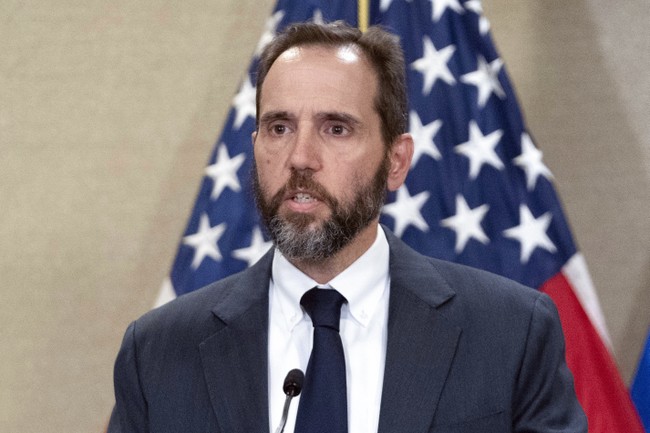You are using an out of date browser. It may not display this or other websites correctly.
You should upgrade or use an alternative browser.
You should upgrade or use an alternative browser.
Special Council Corruption and Malfeasance
- Thread starter GURPS
- Start date
It seems that US Grant appointed the first special counsel, John B. Henderson, in 1875 for the Whiskey Ring scandal.I'm sure @Ken King will correct me (please do Ken), but Special Counsels are a relatively a new thing correct? They grew out of the Independent Counsel legislation which was allowed to expire.
Jack Smith Appeals Judge Cannon’s Decision to Toss Classified Docs Case – Trump Spox Responds
“The bottom line is this: The Appointments Clause is a critical constitutional restriction stemming from the separation of powers, and it gives to Congress a considered role in determining the propriety of vesting appointment power for inferior officers,” the judge wrote in a 93-page filing.
“The Special Counsel’s position effectively usurps that important legislative authority, transferring it to a Head of Department, and in the process threatening the structural liberty inherent in the separation of powers,” Cannon wrote.
Trump spokesman Steven Cheung responded to Jack Smith’s appeal.
“As we move forward in uniting our nation after the horrific events on Saturday, this dismissal of the lawless indictment in Florida should be just the first step, followed quickly by the dismissal of ALL of the Witch Hunts,” Trump spox Steven Cheung said referring to the assassination attempt against President Trump.
“The Democrat-led Justice Department should drop these politically motivated, election interference efforts against President Trump immediately. Let us come together to END the weaponization of our justice system and Make America Great Again!” he said.
Jack Smith’s Anti-Trump Deputy Excoriated For Inappropriate Behavior At DOJ
However, J.P. Cooney, a Justice Department official now serving as Special Counsel Jack Smith’s top deputy, cultivated a politically toxic environment, disseminated baseless conspiracy theories about Trump and his political appointees, and engaged in unprofessional conduct as he oversaw the team making sentencing recommendations, according to the same report.
Cooney is mentioned (as the “Fraud and Public Corruption Section Chief”) a whopping 394 times in the 85-page report released from the Justice Department’s inspector general on July 24. Cooney supervised a team of four attorneys who prosecuted Stone for what the government successfully argued in front of a Washington, D.C., jury were lies and obstruction during Special Counsel Robert Mueller’s investigation into Trump campaign officials. Mueller’s two-year, $32 million investigation was itself spun up by anti-Trump officials in the Justice Department after the Democrat National Committee and Democrat presidential nominee Hillary Clinton bought and paid for an information operation falsely alleging the Trump campaign was in cahoots with Russia to steal the 2016 election. Two members of Cooney’s team also worked on the Mueller investigation.
The Fraud and Public Corruption (FPC) team sought an unprecedented sentence of seven to nine years in prison for Stone, dramatically beyond what others convicted of similar crimes faced. When developing that sentencing goal, the team by its own admission thought the “closest analogue” to the Stone conviction was that of Scooter Libby, a target of a previous special counsel in a highly controversial prosecution. Libby’s proposed sentencing range was 30-37 months and he was sentenced to 30 months, which was derided as “excessive” by former President George W. Bush.
Yet the Cooney team larded up the Stone sentencing memo with every escalatory adjustment it could find, however disputable, to achieve a much harsher sentence and treat Stone differently than the Justice Department treats other defendants.
As soon as Cooney’s supervisors saw what he and his team had planned, “they all agreed that the sentencing recommendation was too high” and expressed grave concern about the situation. Interim U.S. Attorney Timothy Shea, who had started on the job just that week, said he “had never seen [perjury] cases produce a sentence that high, and that he was aware of many violent crimes that did not result in sentences ‘anywhere near’ the sentence the team was recommending for Stone,” according to the report. He noted that the escalatory adjustments were arguably made in error, in at least one case, and that the guidance was completely “out of whack” relative to other cases. Further, Stone was a “first-time offender, older than most offenders, and convicted of a nonviolent crime,” and “comparable cases” were sentenced around two to three years.
The report is expected to detail Smith's findings on key cases involving Trump, including allegations of election subversion and mishandling of classified documents. Attorney General Merrick Garland is expected to publicly release the special counsel report.
"Historically, these special counsel reports are quite detailed," CNN legal analyst Elie Honig said Tuesday morning in an interview with Jim Acosta. " I think this will be Jack Smith's last and best chance to tell his story in both cases. He's already done that to some extent through his indictments and court filings, but this will be it — this will be the historical record."
While the Jim Acostas and Rachel Maddows of the world are going to get really excited about this, I'm less concerned about the whole ordeal. Far from being the "historical record," it will be the word of a man who served as a partisan apparatchik for an administration seeking to put its political opponent in jail to influence an election. Whatever he releases will just come across as the last shallow gasp of a failed special counsel.
To put it simply, no one cares about this anymore. If any of this mattered, Kamala Harris would have won the election. No doubt, Smith's report will include lots of salacious nonsense meant to spoil Trump's second inauguration, but it's ultimately powerless. In that sense, I'm almost happy it's being released. It'll be entertaining to see Joy Reid and company whip themselves into a lather over something that will have zero impact on the incoming administration.

